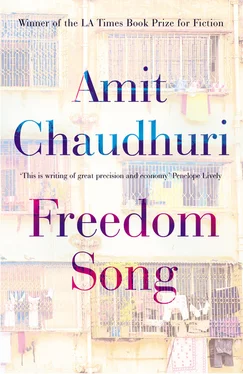‘Really? Are you sure?’ It was morning again. Khuku was speaking to Mohit’s mother, Puti, in their familiar East Bengali dialect.
‘Mohit told me yesterday.’
Khuku laughed, disarmed by the picture that composed itself before her eyes — Bhaskar marching down the street early in the morning, brandishing newspapers.
‘What will he do next?’ she said.
‘He should get married before he does anything.’
‘I hear they’re trying to find a girl.’
‘It won’t be easy.’
‘Oh, it won’t be easy, will it?’ she asked.
She cradled the receiver and curled her toes; her feet were up on the divan.
‘Mashi, how can it be easy?’ cried Puti. Her voice came agitated but musical on the ear-piece. ‘You know how long Arun took to find a wife.’
‘Yes, Arun,’ agreed Khuku. ‘But Arun is so. . short.’
‘Arun is short but Bhaskar is dark,’ said Puti. ‘And tell me, which father will give away his daughter to a boy who has Party connections?’
‘Which father will?’ echoed Khuku. ‘It’s Bhola’s fault. Though he’s a good-looking boy in his way. I used to call him “Black Beauty” when he was younger.’
‘Leave your “Black Beauty”,’ said Puti. ‘“Black Beauty” won’t help him when his father-in-law finds he sells Ganashakti.’
Later, Khuku put her feet in her slippers and walked to the dining-table. Mini was wrapped in a shawl, and Khuku’s husband was wearing a dark blue slip-over upon a shirt whose sleeves were rolled up above his wrists.
‘It’s cold,’ said Khuku, pulling her shawl tightly around her shoulders.
Both hers and Mini’s hair were tied in buns at the back; both had wavy hair, but Khuku’s was crowded with curls, with not an inch of straightness to be found anywhere, only skips and jumps and leaps.
‘Yes,’ said Mini. ‘Ever since yesterday.’
‘You should wear your full-sleeve pullover,’ said Khuku to her husband.
‘Where is it?’ he asked, a little crossly but dreamily.
‘Can’t you find anything? Mini,’ she said, ‘he really can’t do anything for himself, and, God forbid, if I die before he does. .’
Mini smiled at her friend.
‘Have some oranges,’ said Khuku to Mini. ‘They’re sweet as sugar. Mritunjoy bought them yesterday from Park Circus, and do you know how much they cost — you won’t believe me — fourteen rupees a dozen.’
‘What are you saying?’ said Mini, looking up.
‘Yes — fourteen rupees a dozen! Who said Calcutta is not an expensive city? They say that Bombay is expensive, but I think Calcutta is no less.’ She said this as a complaint but a note of pride was audible in her voice.
‘Jochna!’ she cried. ‘Give Didimoni an orange! No, don’t give it, bring the bowl here, I’ll choose one myself.’ Jochna, with a mysterious smile on her face, held the bowl in her hands while Khuku delved in a hugely absorbed way into the oranges, turning them over, till she picked one and handed it to Jochna. ‘Give it to Didimoni,’ she said.
‘Give one to Shib,’ murmured Mini.
She looked at her husband, as if she had just noticed him.
‘Will you have one?’ she said.
He shook his head, never wasting a word if he didn’t have to. As Mini, with her small dark fingers, ripped the peel, the smell of orange suddenly burst upon the air.
‘Do you know what Puti told me?’ Khuku separated the portions of the orange, which came off with white threads hanging by their sides like bits of cobweb. Absent-mindedly she picked off some of the threads with her finger and put a piece in her mouth. ‘Bhaskar sells Ganashakti in the morning. Mmm, it’s like sugar.’ She picked up another piece and sprinkled sweet white powder upon it. ‘The sweeter the better,’ she said. Such a sweet tooth had she that when she was a girl she would eat handfuls of sugar, crunching the large unrefined crystals happily with her molars, and no one would notice, for she was a lonely child who haunted the margins of her large family. Once she had eaten sweet homoeopathic pills till they had given her a stomach-ache, much to the disgust of her elder sister. What was normally called ‘food’ had held no appeal for her until she got married.
‘Ganashakti?’ said Khuku’s husband.
‘Yes,’ said Khuku, spitting out the pips into her cupped hands. ‘Mohit was there with him.’
Khuku’s husband shook his head, but said nothing.
‘There are many boys in my area,’ said Mini, putting a piece of orange in her mouth, ‘who get so involved they don’t do anything else for the rest of their lives. Many. Two boys, Anshuman Biswas and Partho Guha — good students at school — have even left their jobs.’ Khuku and Mini worked busily while talking, spitting out pips which were being heaped in torn pieces of the peel. They were enjoying the winter.
When afternoon came to Vidyasagar Road, wet clothes — Piyu’s dresses, Bhaskar’s pyjamas and kurtas, even a few soggy towels — hung from a clothes-line which stretched from one side to another on the veranda of the first floor. The line, which had not been tightly drawn anyway, sagged with the pressure of the heavy wet clothes that dripped, from sleeves and trouser-ends, a curious grey water on to the floor, and, especially in the middle, one noticed the line curved downward, as if a smile were forming. To the people in the house, the clothes formed a screen or curtain which threw shadows and provided bewitching glimpses of the speedy criss-crosses of the grill, and through those criss-crosses bits of the balcony of the house opposite and the sky and the shajana tree, all of which surprised by still being there. The slow leaking of the drops of water from the clothes and their casual, flirtatious flutter with every breeze would not have been noticed by the passer-by on the road, who, if he had looked beyond the remaining leaves on the shajana tree and the iron nerve-pattern of the grill, would have seen them suspended there stilly, like ghosts or patches of colour. Who had put them there? To know that, one would have had to be present at half-past two, when Haridasi, helped by Bhaskar’s mother, watched regally by Piyu, had hung up the clothes one by one, till the passer-by would have seen all the figures, including Piyu in the doorway, gradually consumed by the clothes that they were hanging up.
Winter came only once a year, and it changed the city. It gave its people, as they wore their sweaters and mufflers, a sense of having gone somewhere else, the slight sense of the wonder and dislocation of being in a foreign city. Even the everyday view from their own houses was a little strange. Smoke travelled everywhere, robbing the sunlight of its fire. Afternoon, with its gentle orange-yellow light, was the warmest time of day, though the wet clothes, assisted by a breeze, dried more slowly than in the summer. And as the orange light fell on the brickwork and the sides of the houses, it was easier to tell, from the flushed rose centre that now appeared on a terrace and now a parapet, that its origins lay in fire.
On the street, Tommy the dog haunted the rubbish-heap again, probing, in a concerned way, its bright smelly edges with his nozzle. When someone cranked the handle of the tube-well, it creaked and twanged like a one-string instrument. Crows, sometimes alighting on a window-sill or a banister, clamoured as usual, comforting the child in every human figure in the house, those who were half asleep or awake, bringing up memories of other human, beloved faces, or creating the expectation of homecomings. Their cries had something to do with hope and return and the continuance of human business. Bhaskar’s mother, turning in her sleep, grew full with the return of her son in the evening.
Читать дальше












